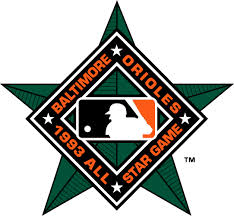The Atlantic Blames Baltimore for ASG Decline
Have you read this article from The Atlantic, in which author Thom Loverro blames the decline of Major League Baseball’s All Star game on the city of Baltimore? If not, then me save you some time:
Thom Loverro is an idiot.
The article recounts the events of the 1993 Mid Summer Classic where Cito Gaston performed feats of asshattery that have yet to be topped. You know the story. The AL was beating the snot out of the NL, and Gaston just couldn’t find a way to get hometown representative Mike Mussina into the game. More accurately, Cito Gaston couldn’t get over himself enough to look past AL East rivalry and do what was best for baseball in its signature exhibition of the sport.
Here’s a nice little clip from the article:
In 2002, the All-Star Game crumbled before baseball commissioner Bud Selig’s eyes, right in his hometown of Milwaukee. The game ended with the embarrassing scene of Selig conferring with American League manager Joe Torre and National League skipper Bob Brenly after 11 innings of play, a 7-7 tie, and no more players to use. Selig called the game a tie, and the decision rocked baseball.
Selig has insisted that the 2002 All-Star tie debacle was a result of what happened in Baltimore in 1993. “The game had slipped,” Selig told reporters in 2005. “I think in 1993, it started to slip. When Mike Mussina didn’t get in the game in Baltimore and Cito Gaston got booed. It was very ugly.”
The 1993 All-Star Game changed the way managers handled using players: Fearing that they would suffer the same wrath Gaston did for not using Mussina with the hometown fans looking on, managers were careful to create rotations that could showcase every one of the fans’ favorites—leading to the game where they ran out of players.
Today, managers still seem to operate under the premise that they had better get every player in the game, or else face criticism like Gaston did 20 years ago. And the game has suffered for it. So if you’re not happy with the state of baseball’s All-Star Game, blame it on Baltimore.
What?
OK. I’ll try to explain why this is dumb. And I’ll try to use small words.
Managers should not feel pressured to use all of the players on the roster. That is not what the Baltimore crowd/fanbase were upset about. They were upset because Gaston refused to use the hometown All Star representative when he had multiple chances to do so. He even brought in one of his own players to close out the game.
The guys managing the All Star Game are the ones that went to the World Series the year before. These are good managers. Experienced baseball men. I have more faith in them than does Thom Loverro. Their game management skills are good enough for them to figure out how to include the hometown guys in the game, without blowing out the roster in case of extra innings.
Take for example… 2013. AL Manager Jim Leyland designated Oriole Chris Tillman to be his “emergency arm” in the bullpen in case the game went long. Tillman was a perfect choice:
- He was a late addition to the roster
- He plays for a team that had plenty of other All Star representation
- HE IS NOT A MEMBER OF THE HOST TEAM
Certainly, the All Star Game has lost some of its luster. It could be interleague play. It could be expanded media (and social media) gives us such intimate access to the stars of both leagues that fans don’t feel the draw to the All Star Game the way they once did. Whatever the reason, baseball’s All Star game does not suck because of Baltimore.
Give us one in 2016. We’ll prove it to you.
And yes, Thom, there will be a few “Cito Sucks” chants. Because it is true.
One Reply to “The Atlantic Blames Baltimore for ASG Decline”
Comments are closed.


Wait. Wait. What did Selig say? It almost seems like Loverro is basing his thesis on Selig’s comment. Loverro is still an idiot, but that comment is left kind of unexplained.
And this year’s ASG was beautifully managed.